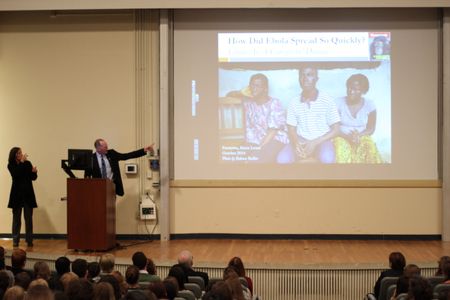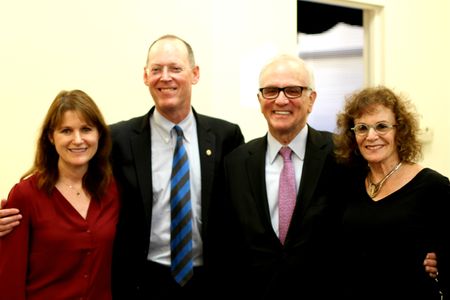Paul Farmer Draws Hundreds to Discuss Global Health
Yesterday, more than 600 people gathered at the College of General Studies to hear Dr. Paul Farmer speak as part of the 25th annual Stanley P. Stone Distinguished Lecture Series. The auditorium started filling in as early as 2:15 p.m., buzzing in anticipation to hear Dr. Paul Farmer speak at 4 p.m. Even Dean Natalie McKnight confessed, “I’m a bit in awe, as you are one of my personal heroes,” as she welcomed Farmer to the stage. The event attracted BU undergraduate and graduate students, faculty, alumni, and even those from other universities and locals.

Charged to speak about the current state of global health, Farmer framed the conversation by citing one of BU’s most famous alumns, Martin Luther King Jr.: “Of all the forms of inequality, injustice in health care is the most shocking and inhumane.” Farmer went on to contrast the healthcare expectations between a developed and developing world, advocating to close that gap with an example from a trip just last year to Sierra Leonne. His Partners in Health team found an infant alone in a home where the adults had died from Ebola. Her veins had shrunk from dehydration and were too tiny to insert a needle for the medicine. Fortunately, the team was able to hydrate the infant and administer medication, and a volunteer commented that it was a “miracle.” “It’s not a miracle,” reflected Farmer. “It’s how medical care should be. A baby who falls sick in the United States can expect an IV bag, if that’s what’s needed. Adequate health care is a right, not a miracle.”
One of the biggest figures in the global public health arena, Farmer used years of experience treating infectious diseases to suggest the “six pitfalls in global public health.” Using the most recent epidemic, Ebola, Farmer illustrated each point: prevention versus care, absence of specialists, weak infrastructure, fixed costs, cost of inaction, and lack of sustainability. One could feel the thoughts stirring in the 600 attendees– be it current medical-related students, graduates, researchers; or those working for organizations that help fund or mobilize relief– of what actions could be taken to help improve the situation.
Even though he discussed painful subjects, Farmer charmed the audience by peppering in personal anecdotes and jokes. He also projected a positive outlook to the audience. Reflecting on the progress that has been made over the past two decades in Rwanada, Farmer summed up, “That gives me hope.” With a dismal life expectancy in the wake of the 1994 genocide and as one of the world’s poorest countries, Rwanda has seen significant improvement since building high-quality health care systems.
Truly a man committed to others, Farmer didn’t leave the building until nearly 11 p.m. Nearly 350 people lined up for the book signing, and Farmer not only signed each copy, but also held a substantive conversation with every single person. “That is truly remarkable and in my experience unprecedented,” commented McKnight.

The Lecture Series was instituted in 1980 through the generosity of Stanley Stone (CGS 64, Questrom 66), “This [donor opportunity] immediately appealed to me since it would be a gift to all the students at the College, the faculty and alumns, and would be given annually in perpetuity,” comments Stone. “The two years at CGS were the most stimulating and meaningful of my entire education. I believe in the value of the integrated core curriculum and team teaching approach at CGS. It meant a lot to me, and I trust it has and will be to many others.” The College of General Studies aims to equip students with key skills and foundational knowledge to help be forces of change in the world.
For those who were unable to attend, the lecture is posted on the Stanley P. Stone Distinguished Lecture Series page.